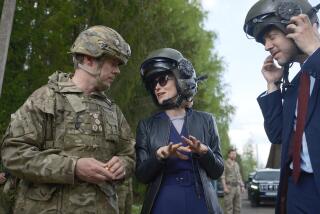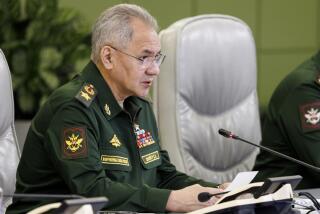Russian Warnings Worry Neighbors : Militarism: Foreign minister’s threats leave former Soviet republics fearing intervention.
- Share via
MOSCOW — In just three days, Russian Foreign Minister Andrei V. Kozyrev has upset Baltic leaders with a threat of force to protect minority Russians, paralyzed Tajik peace talks with a hint of military intervention and sparked fears of resurgent Russian nationalism throughout the “near abroad.”
While officials insist that Kozyrev has only reiterated longstanding policy, political observers suspect the mild-mannered but mercurial foreign minister might be trying to toughen Russia’s posture with its neighbors.
“I want to think it’s coincidence, but it’s too much for one week,” Viktor I. Borisyuk, deputy chief of the Presidential Analytical Center, said of recent comments by Kozyrev that have former Soviet republics watching warily for evidence of neo-imperialist designs.
At a Tuesday meeting of Russia’s Foreign Policy Council, Kozyrev accused newly independent countries of the former Soviet Union, which Russians refer to as the “near abroad,” of repressing their ethnic Russian minorities.
He singled out Estonia and Latvia, accusing the two Baltic states of “a deliberate policy of banishing ethnic Russians” as well as depriving Russians of language and political rights.
In enumerating the range of pressures Russia could bring to bear, Kozyrev said armed force should not be ruled out.
“In certain cases, the use of direct military force might be necessary to protect our compatriots abroad,” he told the council.
On Wednesday, Kozyrev warned Tajik opposition leaders, who are in Moscow for peace talks with the Tajikistan government, that Russia “will not put up with” deadly attacks on its peacekeepers, who patrol the Tajik-Afghan border. The Tajik opposition delegation stormed out of the talks, denouncing Kozyrev’s statement as threatening.
Russia insists on maintaining a military presence in Tajikistan to prevent drugs and weapons from passing through that country into restive regions of southern Russia, but its border guards suffer frequent casualties.
The Russian commander of the border patrol, Gen. Valery Patrikeyev, said Thursday that most of the 100 peacekeepers killed during the 18-month-old mission were victims of “diversions of the Tajik opposition.”
Kozyrev’s veiled threats of military recourse caused dismay among Russia’s neighbors, primarily in the Baltic countries where resentment lingers over half a century of Soviet domination.
Estonia’s Foreign Ministry issued a statement saying the government “is increasingly concerned about the growing anti-democratic tendencies in Russia’s foreign policy.”
Latvian government officials demanded that Kozyrev explain what he meant by circumstances that might prompt the use of force, warning that such comments “can negatively affect bilateral relations.”
In Ukraine, acting Prime Minister Yevhen Marchuk told journalists that the Russian ambassador to Kiev had been summoned to explain Kozyrev’s comments, the Interfax news agency reported.
Russia has been restrained in its reaction to recent Ukrainian moves to restrict the sovereignty of the Crimean region, which was part of Russia until 40 years ago and remains largely populated by ethnic Russians. But Ukrainian officials may have seen a menacing message in Kozyrev’s suggestion that Russians’ rights should be defended “with all necessary means.”
More than 20 million Russians live in the 14 former Soviet republics that, along with Russia, are now independent states. Most live in Ukraine and northern Kazakhstan. Russians make up half of Latvia’s more than 2 million people and more than 35% of Estonia’s 1.6 million residents.
Russian Foreign Ministry spokesman Grigory B. Karasin insisted that there was no sinister intent in Kozyrev’s statements, describing the international reaction as “somewhat strange.”
Likewise, Russian state television commentator Nikolai K. Svanidze said Thursday that Kozyrev “for the past two years has been saying the very same things in the same manner.”
Svanidze appeared to be alluding to a December, 1992, speech by Kozyrev in Stockholm, in which the foreign minister described former Soviet territory as “post-imperial space” that the Russian military was obliged to defend.
Kozyrev later suggested his comments were in jest. But he stood by this week’s remarks, telling reporters that the mention of possible armed force “was not a slip of the tongue.”
The government newspaper Izvestia, in a front-page article questioning whether Kozyrev was fostering a more aggressive foreign policy, deemed his comments a “very grave blunder on the eve of a Russian-American summit.”
Borisyuk, from the presidential analytical center, which advises Russian President Boris N. Yeltsin, expressed concern that the forthcoming visit by President Clinton and the May 9 celebrations for the 50th anniversary of the Allied defeat of Nazi Germany might be behind the harder line Kozyrev is taking toward Russia’s neighbors.
“Even three years after the decay of the Soviet Union, nobody has any idea how to resolve the problem of Russians living in the Baltics, in Kazakhstan, in Ukraine,” Borisyuk said.
He and the Izvestia writer suggested that Russian officials might be trying to make a disillusioned public feel like citizens of a superpower again.
More to Read
Sign up for Essential California
The most important California stories and recommendations in your inbox every morning.
You may occasionally receive promotional content from the Los Angeles Times.














